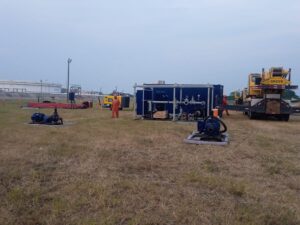INTERVIEW
Tank cleaning terrestrial with Hussein Kadour Ponce

Interviewer: Good afternoon, today we have the pleasure of speaking with Hussein Kadour Ponce, an expert in land tank cleaning. Welcome, Hussein!
Hussein Kadour Ponce: Thank you for having me! It’s a pleasure to participate in this interview.
Interviewer: To start off, can you tell us a little about the importance of cleaning land tanks and why it is a relevant topic in the industry?
Hussein Kadour Ponce: Of course. Cleaning land tanks is essential to ensure the safe and efficient operation of liquid storage facilities. These tanks can contain a variety of products such as oil, chemicals, and food, and over time, sediments, residues, and other unwanted materials accumulate inside. The presence of these contaminants can affect product quality, cause blockages in pipes and measurement systems, and even increase corrosion and safety risks. Therefore, regular cleaning of land tanks is vital to maintain operational integrity and ensure the quality and safety of stored products.
Interviewer: What are the major challenges associated with the cleanup of land tanks and how are they addressed?
Hussein Kadour Ponce: Cleaning land tanks can present several challenges. One of them is selecting the appropriate cleaning methods. Depending on the nature of the sediments and residues, different techniques can be used, such as pressure washing, the use of chemical agents, or mechanical cleaning equipment. Additionally, safety is a critical aspect of tank cleaning since workers are exposed to risks such as toxic gases and confined spaces. Therefore, strict safety protocols must be followed, including the use of personal protective equipment and the implementation of proper ventilation measures. It is also important to consider the correct disposal of waste and to comply with environmental regulations.
Interviewer: What is your recommendation to maintain the cleanliness of land tanks effectively?
Hussein Kadour Ponce: My main recommendation is to establish a regular preventive maintenance program. This involves conducting periodic inspections to assess the accumulation of sediments and residues and scheduling cleanings based on the specific needs of each tank. In addition, it is essential to properly train the personnel in charge of cleaning so that they can perform the tasks safely and efficiently. Advanced technologies can also be implemented, such as remote tank monitoring and the use of cleaning robots, to optimize the process and minimize associated risks.
Interviewer: Excellent. To finish up, is there any additional tip you’d like to share with our readers about cleaning land tanks?
TANK CLEANING HUSSEIN KADOUR PONCE
Hussein Kadour Ponce: Yes, I’d like to emphasize the importance of having a team of professionals experienced in land tank cleaning. These experts have the knowledge and resources necessary to carry out the tasks safely and efficiently. It’s also crucial to stay up-to-date with regulations and industry best practices to ensure proper compliance. Finally, remember that land tank cleaning is an investment in the quality, safety, and efficiency of operations and should not be overlooked.
Interviewer: Thank you, Hussein, for sharing your knowledge and tips on land tank cleaning. This has been a very informative and valuable interview.
Hussein Kadour Ponce: It has been a pleasure to participate. I appreciate the opportunity to share my experience. Thank you!
